0-10V output hydrostatic sensors, probes & transducers for accurate liquid level and head pressure measurement. Ideal for industrial tanks, boreholes & process control systems.
Hydrostatic sensors, probes, and transducers with a 0-10 volt amplified analog output deliver precise liquid level or head pressure measurements, ensuring compatibility with common PLCs and data acquisition systems. These devices convert hydrostatic pressure, influenced by fluid density, into a directly proportional 0-10V signal. Options include submersible probes for direct immersion in various fluids within tanks or boreholes, often using materials like stainless steel, and externally-mounted transducers that fit to vessel connections for applications such as process or chemical storage tanks.
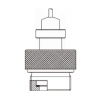 Viscous soap and detergent storage hydrostatic level measurement - Flush-mounted ceramic transducer for monitoring tank levels in viscous soap and 50% sodium hydroxide applications.
Viscous soap and detergent storage hydrostatic level measurement - Flush-mounted ceramic transducer for monitoring tank levels in viscous soap and 50% sodium hydroxide applications.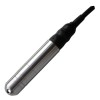 Immersible water level sensor for 4 metre deep cold water storage tank - Fully immersible water level sensor for measuring level of water in a cold water storage tank.
Immersible water level sensor for 4 metre deep cold water storage tank - Fully immersible water level sensor for measuring level of water in a cold water storage tank.
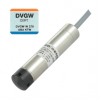 LMP307 Submersible Level Transmitter
LMP307 Submersible Level Transmitter 18.605 G Low Cost Submersible Diesel Fuel and Water Tank Level Sensor
18.605 G Low Cost Submersible Diesel Fuel and Water Tank Level Sensor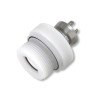 LMK351 High Overpressure Flush Level Transmitter
LMK351 High Overpressure Flush Level Transmitter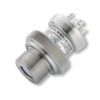 LMK331 Screw-In Ceramic Level Transmitter
LMK331 Screw-In Ceramic Level Transmitter
- Low cost 2 metre high diesel tank level sensor with 0-10 volt output - Cost effective level sensor 0 – 2m, media is diesel fuel, output is 0-10V
- Industrial dishwasher 0-1m 0-10Vdc water level sensor - Compact and economically processed submersible hydrostatic pressure sensor, which can be submerged in or mounted externally to an industrial dishwashers integrated water tank.
- BMS water tank 6mH2Og range 0-10V out submersible level sensor for commercial buildings - This submersible level sensor provides accurate and reliable water level measurement in BMS applications in commercial office buildings, with a 0 to 6 mH2O gauge pressure range and a 0 to 10V output signal.
- Ebb & Flow (Flood & Drain) Horticulture Hydroponic System 100mm Water Level Sensor - We are looking for a level sensor for measuring from 0 to 100mm of water height, in an ebb and flow horticulture hydroponic system used in greenhouses and indoor farms.
- Borehole water level transducer to determine recharge rates - Borehole water level transducer for lowering into a borehole to measure the changing water level, and determine the recharge rate.
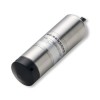 LMK382 Low Range IP68 Waste Water Level Transmitter
LMK382 Low Range IP68 Waste Water Level Transmitter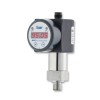 DS200 Combined Hydrostatic Level Switch, Gauge and Sensor
DS200 Combined Hydrostatic Level Switch, Gauge and Sensor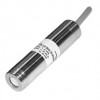 LMK307 Submersible Waste Water Level Sensor
LMK307 Submersible Waste Water Level Sensor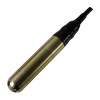 SWL Marine Bronze Submersible Level Sensor
SWL Marine Bronze Submersible Level Sensor
 IMCL Submersible Absolute Reference Depth Sensor
IMCL Submersible Absolute Reference Depth Sensor IMCL Low Cost Submersible Pressure Sensor
IMCL Low Cost Submersible Pressure Sensor IMSL IP68 Stainless Steel 316L Hydrostatic Pressure Sensor
IMSL IP68 Stainless Steel 316L Hydrostatic Pressure Sensor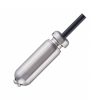 IMTG Low Cost OEM Submersible Tank Gauging Level Sensor
IMTG Low Cost OEM Submersible Tank Gauging Level Sensor
Find out more about 0-10 Volts Output Hydrostatic Sensors, Probes & Transducers to determine which product options and capabilities will best meet your application requirements.
Hydrostatic sensors, probes, and transducers featuring a 0-10 volt amplified analog output provide a robust and widely compatible solution for precise liquid level or fluid head pressure measurements. This specific voltage output is favored in many industrial and research applications due to its straightforward interfacing with a variety of data acquisition systems, programmable logic controllers (PLCs), and panel meters that readily accept high-level voltage inputs. The amplified nature of the 0-10V signal enhances its integrity over moderate transmission distances, particularly in environments where unamplified sensor signals might be susceptible to electrical noise, offering a clear and stable representation of the measured parameter. These devices typically operate on a three-wire system (power, ground, and signal output), simplifying wiring in many installations.
The core measurement principle relies on the hydrostatic pressure exerted by a vertical column of liquid. This pressure, directly proportional to the height of the liquid above the sensor diaphragm (P=ρgh, where ρ is fluid density, g is gravitational acceleration, and h is height), is precisely converted by the sensor’s internal electronics into the 0-10V DC output. For example, a sensor might be calibrated so that 0 volts corresponds to no liquid (zero head pressure) and 10 volts corresponds to the maximum measurable liquid height, such as 5 meters or 20 feet of water. Accurate level determination therefore also requires consideration of the specific gravity of the fluid being measured, as variations in density will directly affect the pressure exerted for a given level.
For applications requiring direct immersion into the fluid, submersible hydrostatic level probes with a 0-10V output are commonly selected. These units are often constructed from durable materials like stainless steel (e.g., 316L), PVDF, or even titanium, ensuring compatibility with a wide range of liquids, from benign water sources to more aggressive chemicals or wastewater. A critical design feature of these submersible probes is the integrity of the cable and its sealing, often utilizing robust polyurethane (PUR) or FEP sheathing. For vented gauge pressure measurement, which compensates for atmospheric pressure changes to provide a true liquid level, the cable will incorporate a vent tube that must terminate in a dry, clean area, often through a desiccant-filled filter to prevent moisture ingress. These submersible types are extensively used for level monitoring in boreholes, wells, storage tanks, sumps, reservoirs, and open channel flow measurement.
Alternatively, hydrostatic level transducers with a 0-10V output are available for external mounting, typically at the base of a tank or vessel via a threaded process connection (such as G1/2″, 1/4″ NPT, or other standard fittings). These externally mounted transducers measure the static head pressure of the liquid contained within. Careful consideration of the mounting position is important to ensure the sensor is at the lowest point of the desired measurement range and to avoid potential blockages from sediment or sludge. Such configurations are common in industrial process vessels, chemical storage tanks, food and beverage processing tanks where external access is preferred, and in various OEM machinery that incorporates automated liquid level control based on the 0-10V feedback signal. The choice between a submersible probe and an externally mounted transducer will depend on the tank design, the nature of the liquid, and maintenance accessibility.
Engineers and technicians selecting these 0-10V output hydrostatic sensors must carefully consider the required measurement range to ensure optimal resolution and accuracy from the 0-10V span. Calibration procedures often involve adjusting the zero and span outputs against known liquid levels or applied pressures, and the direct voltage reading can simplify diagnostic checks in the field. The environmental conditions, including temperature fluctuations and the potential presence of corrosive substances, will also guide the selection of appropriate housing and wetted part materials to ensure long-term operational reliability. The inherent simplicity and effectiveness of the 0-10V signal make these hydrostatic sensors a staple in diverse applications, from water resource management and environmental monitoring to intricate industrial automation and control systems.
